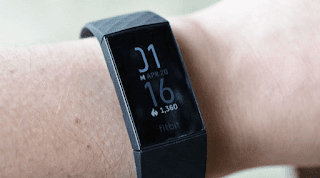Best fitness trackers you can buy
Smartwatches aren't your only options. |
| Fitness band |
What do fitness trackers do best?
The answer seems simple: Fitness trackers are best at monitoring exercise, be it a 10-minute walk around the block or a half marathon you’ve diligently trained for. Obviously, smartwatches can do that too, but there are some areas where fitness bands have the upper hand: focus, design, battery life and price.Battery life tends to be better on fitness trackers, too. Most fitness bands will last five days to one week on a single charge -- and that’s with all-day and all-night use.
When to enter Smartwatch Land
If you need a bit more from your wearable, you’ll want to opt for a smartwatch instead. There are things like on-watch apps, alerts and even more robust fitness features that smartwatches have and fitness trackers don’t. You can use one to control smart home appliances, set timers and reminders, check weather reports and more. Some smartwatches let you choose which apps you want to receive alerts from, and the options go beyond just call and text notifications.But the extra fitness features are arguably the most important thing to think about when deciding between a fitness tracker and a smartwatch. The latter devices tend to be larger, giving them more space for things like GPS, barometers, onboard music storage and more. While you can find built-in GPS on select fitness trackers, it’s not common.
EdithZod picks
Best overall: Fitbit Charge 4
 |
| Fitbit Charge 4 |
While on the expensive side for a fitness tracker, the ₹10,999 Fitbit Charge 4 has all the features you’d need from an activity band and more. Its major selling point is built-in GPS. it will track outdoor runs, bike rides and more on its own and automatically upload maps to the Fitbit app. It has a good heart rate monitor as well that works all day and all night to record pulse data. Fitbit’s new active zone minutes will also let you know when you’ve moved into a different heart rate zone while working out, which can be really motivating mid-run.
The Charge 4 also includes Spotify control and Fitbit Pay as standard features, so you can pause and play tracks while you’re working out and pay for a coffee on your way home without having your wallet. Lots of competing trackers don’t have features like that (especially NFC payments), so we think they, along with its litany of other fitness features, justify the Charge 4’s higher price tag. We also appreciate that the Charge 4 gets roughly five days of all-day and all-night use on a single charge, and you’ll be able to get a couple days of battery life even when using the GPS regularly.
check out this video:
Alternative: Garmin Vivosmart 4
 |
Garmin Vivosmart 4 |
A more subtle-looking alternative is the ₹12,499 Garmin Vivosmart 4. It’s thinner than the Charge 4 and fits in a bit better with bracelets and other jewelry you might wear regularly. But its attractive design is only part of its appeal -- Garmin knows how to track fitness, and the Vivosmart 4 is proof that you don’t need to drop hundreds on one of the company’s fitness watches to get a solid device.
Like the Charge 4, the Vivosmart 4 tracks all-day activity and sleep and has a pulse ox sensor for blood oxygen saturation measurements. It has only connected GPS capabilities, and it has universal music controls that can control the playback of most anything. The band is also waterproof and can track basic swim workouts, plus it also has a battery life of up to seven days. While it’s similar to the Charge 4 in that the Vivosmart 4 works with both Android and iOS devices, it’s a bit more flexible as it syncs with Apple Health (the Charge 4 and other Fitbit devices do not).
Best budget: Fitbit Inspire HR
 |
Fitbit Inspire HR |
The ₹6,499 Fitbit Inspire HR is the best option. It strips out all the luxury features from the Charge 4 and keeps only the essentials. You won’t get built-in GPS, Fitbit Pay or Spotify control but you do get excellent activity tracking, automatic workout detection, smartphone alerts and plenty more. The “HR” designation means it includes an optical heart rate monitor -- you could save an extra $30 and opt for the Fitbit Inspire, which doesn’t track pulse, but we recommend the Inspire HR if you can afford it.
The Inspire HR is thinner than the Charge 4 but it also has interchangeable bands, so you can switch up its style whenever you feel like it. It has connected GPS instead of a built-in sensor, so you can map workouts -- you just have to bring your smartphone along for the ride. Its design is also swimproof, and it should last up to five days on a single charge. All of these features make it the best value fitness tracker you can get.
Alternative: Samsung Galaxy Fit
 |
Samsung Galaxy Fit |
Best fitness trackers you can buy
 Reviewed by Kartikeya Singh
on
May 25, 2020
Rating:
Reviewed by Kartikeya Singh
on
May 25, 2020
Rating:
 Reviewed by Kartikeya Singh
on
May 25, 2020
Rating:
Reviewed by Kartikeya Singh
on
May 25, 2020
Rating:
No comments: